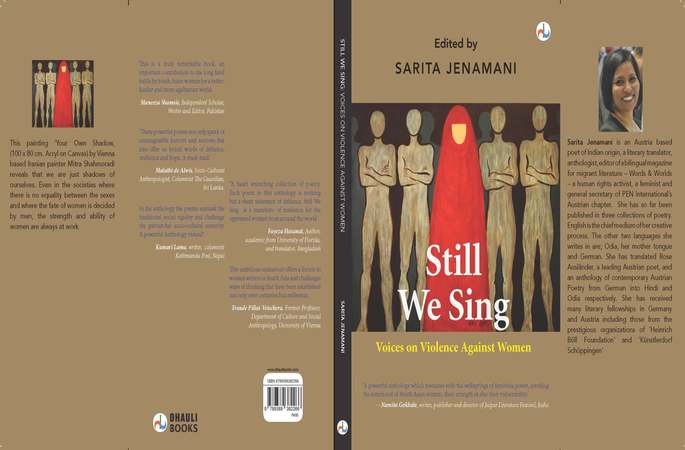Editor: Sarita Jenamani.
Publisher: Dhauli Books, India
‘Guilt is not only for evildoers’ is a line in the poem of Punjab based Nalini Priyadarshni. But what to do with this overwhelming bad feeling of guilty womanhood, everywhere; East, West, North and in Southasia?
How to counter misogyny, toxic masculinity, patriarchal structures in every stratus of society? Close doors, hide anger, weep or open windows doors, make a wide step, and cry out? Sing aloud? Silence.
Editor, Vienna based Oriya poet Sarita Jenamani says, ‘Silence leaves women bereft of solidarity but words brings victims together’. I would go further and say it makes them agents of their own path. And singing is not a new path. In many South Asian societies, one can find the tradition of oral poetry to counter injustice. Poetry lends the victims courage as well as solace. And this anthology goes further and brings together female voices from India, Pakistan, Sri Lanka, Bangladesh and Nepal to shatter stereotypes and expose misconceptions about women in society. The stories of abuse pointed in the poems gives courage for hope to change. As Maya Angelou says, ‘There is no greater agony than bearing an untold silence inside of you ‘. And Jenamani expresses these scars poetically: ‘Don’t ask them/for the traces of their tongues/They are taught/the best part of their sentences/is silence.’
Editor Jenamani says, ‘this book is home to all women voices rendered silent by the vicious trinity of oppression, denial and victim bashing. The idea for this collection came to Jenamani while writing a paper about the literary responses to violence against women in South Asia for PEN Austria. While researching for this paper, she could not find any anthology of prose or poem that addressed the issue directly. So, she set out to amend that herself by bringing together poetry from over 70 female poets of South Asia that challenges the mechanism of silencing the victims of gender-based violence.
The poets in this anthology highlight and challenge issues like domestic violence, forced marriages, dowry-related deaths, sexual molestation, harassment, rape, including marital rape and female foeticide – to mention only a few among them. Some forms of violence can be described and felt only by the victims. And Women writers have marvellously attempted to break this tradition of victim bashing and victim silencing.
Poet Usha Kishore writes, “Do I weep for myself, /for I am lost hope, beating / my weathered bosom/ in the annals of history?/Or do I re-write myself/ as Kali incarnate
/ trampling a nation’s shame? “
Many social systems worldwide confront the phenomenon in words, but few have shown their willingness to attempt to sanction the abusers and protect the victims. Gender-based violence has reached outrageous magnitude due to a gender-biased social system, which has endorsed the construction of a tradition of silencing the issue and the victims with the help of a series of agents involved in propagating this tradition. Nevertheless, it is precisely the tradition of silence, which proves that the witnesses and the victims of male violence are prevented from revealing their victimisation.
Books like this shatter this silence, and that’s why I finally have to unveil another two or three lines in the middle of Priyadarshnis poem mentioned at the beginning:
“… Guilt is not only for evil doers/It’s also the gift of our collective consciousness tot he girls/who turn a deaf earnto laments that follows their birth/and refuse to die./… “
Writing on the part of women is their weapon to counter the violence against them through their own narration. Moreover, writing enables women to recognise their inner strength by speaking the unspeakable.
Silence leave women bereft of solidarity, but words bring victims together. In many societies, one can find the tradition of oral poetry to counter injustice. Poetry lends the victims courage as well as solace.
Poetry may not be the panacea for the problem of violence against women. Still, it provides another perspective of experiences, reactions, and coping with abuse when the victim is the poet. So let all of us learn from wonderful striking sung words in this anthology that arise from all the corners of South Asia!
Writing on the part of women is their weapon to counter the violence against them.



